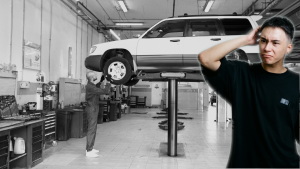As a car owner, you’ve probably heard about undercoating as a way to protect your vehicle from rust. But is it really worth it? Here, we’ll explore the benefits and drawbacks of getting your car undercoated, helping you decide if this rust prevention method is the right choice for you.
What Is Car Undercoating?
Car undercoating involves applying a protective layer to your vehicle’s undercarriage to prevent rust and corrosion. This is particularly important in areas with road salt and harsh weather conditions, where rust can be a serious problem. Understanding the different types of undercoating and how they work can help you make an informed decision.
Types of Undercoating
Several types of undercoating are available:
Oil-Based Undercoating
Popular for its ability to seep into hard-to-reach areas, creating a water-repellent barrier that prevents oxygen from reaching the metal.
Rubberized Undercoating
Provides a thick, durable layer that not only protects against rust but also reduces road noise.
Wax-Based Undercoating
Offers good protection and is easy to apply.
Polyurethane Sealant
A more permanent solution, this type adheres well to metal surfaces and offers excellent rust prevention.
Asphalt-Based Undercoating
A budget-friendly option, though it may not last as long as others.

How Undercoating Prevents Rust
Undercoating works by forming a barrier between your vehicle’s metal parts and elements like moisture and oxygen, which cause rust. Some advanced products even have self-healing properties, filling in small cracks or chips to maintain continuous protection. By covering vulnerable spots like body cavities and seams, undercoating helps extend your vehicle’s lifespan and keeps its value intact.
Advantages of Car Undercoating
Enhanced Rust Protection
The primary benefit of undercoating is its ability to protect your car’s undercarriage from rust. This is especially valuable in areas where your vehicle is exposed to water, road salt, and debris. By creating a protective shield, undercoating can help prevent costly rust-related repairs and maintain your vehicle’s structural integrity.
Defense Against Road Salt
Road salt is notorious for accelerating rust formation on vehicles. Undercoating acts as a defense, keeping salt from directly contacting metal surfaces, particularly in areas like wheel wells and frame rails where damage can accumulate over time.
Extended Vehicle Lifespan
By preventing rust, undercoating can significantly extend the life of your vehicle. Rust not only affects your car’s appearance but can also compromise its structural safety. An undercoated vehicle is likely to stay on the road longer, potentially saving you money on early replacements.
Disadvantages of Car Undercoating
Initial Cost
One of the downsides of undercoating is the initial expense. Professional services can be costly, especially if you opt for higher-quality products. While it might seem like a significant investment, the long-term savings from avoiding rust damage could outweigh the upfront costs.
Risk of Trapped Moisture
If undercoating is not applied correctly, it can trap moisture against the metal, which could accelerate rust instead of preventing it. Ensuring the vehicle is dry and rust-free before application is essential, often requiring professional expertise.
Warranty Concerns
Some vehicle manufacturers may void parts of your warranty if you apply aftermarket undercoating. Improper application could damage components or interfere with factory-applied rust protection, so it’s important to review your warranty terms before proceeding.
Deciding whether to undercoat your car depends on your specific circumstances, such as your local climate, the condition of your vehicle, and your long-term plans. Rust prevention is an investment in your car’s future, so weigh the pros and cons carefully before making your choice.





